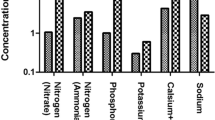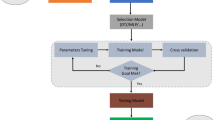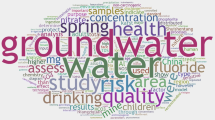Abstract
Urban treated wastewater can be used as a sustainable water supply alternative; however, it contains chemical and biochemical contaminants and poses risks to the affected area. This study aims to assess the risk of treated wastewater application in four sectors: agriculture, landscape irrigation, groundwater artificial recharge, and industry, considering environmental, social, economic, and technical criteria using the novel Hybrid Bayesian Network. The risk of using 27 Iran’s wastewater treatment plants’ effluent in the four sectors were calculated and the Bayesian Networks results demonstrate that four risk models were well trained and were capable of predicting the risks with acceptable performance. Using the trained risk frameworks, the risk of applying the treated wastewater of Tabriz metropolitan wastewater treatment plant in Iran for various sectors was obtained. The results showed that the risk of using the treated wastewater in agriculture, landscape irrigation, artificial recharge, and industry was 26.9%, 17.7%, 18.7%, and 11.9%, respectively. The developed Hybrid Bayesian Network framework in this study can help water resources managers for risk-based prioritizing the effluent reuse scenarios with high performance.














Similar content being viewed by others
References
Ahmadi A, Karamouz M, Moridi A (2010) Robust methods for identifying optimal reservoir operation strategies using deterministic and stochastic formulations. Water Resour Manag. 24(11):2527–2552
Akpan VE, Omole DO, Bassey DE (2020) Assessing the public perceptions of treated wastewater reuse: opportunities and implications for urban communities in developing countries. Heliyon 6(10):e05246
Anbari MJ, Tabesh M, Roozbahani A (2017) Risk assessment model to prioritize sewer pipes inspection in wastewater collection networks. J Environ Manag 190:91–101
Aven T (2011) On some recent definitions and analysis frameworks for risk, vulnerability, and resilience. Risk Anal 31:515–522
Bergmeir C, Hyndman RJ, Koo B (2018) A note on the validity of cross-validation for evaluating autoregressive time series prediction. Comput Stat Data Anal 120:70–83
Chen Z, Ngo HH, Guo W (2013) Risk control in recycled water schemes. Crit Rev Environ Sci Technol 43(22):2439-2510
Emami-Skardi MJ, Momenzadeh N, Kerachian R (2021) Social learning diffusion and influential stakeholders identification in socio-hydrological environments. J Hydrol 599:126337
U.S. Environmental Protection Agency (EPA) (2017) Water quality standards handbook: chapter 3: water quality criteria. EPA-823-B-17-001. EPA Office of Water, Office of Science and Technology, Washington, DC
Geraldi MS, Ghisi E (2019) Short-term instead of long-term rainfall time series in rainwater harvesting simulation in houses: An assessment using Bayesian Network. Resour Conserv Recycl 144:1–12
Guzmán-Fierro J, Charry Sh, González I, Peña-Heredia F, Hernández N, Luna-Acosta A, Torres A (2020) Bayesian Network-based methodology for selecting a cost-effective sewer asset management model. Water Sci Technol 81(11):2422–2431
Haimes Y (2009) On the complex definition of risk: A systems-based approach. Risk Anal 29(12):1647–54
Kaghazchi A, Shahdany SMH, Roozbahani A (2021) Simulation and evaluation of agricultural water distribution and delivery systems with a Hybrid Bayesian Network model. Agric Water Manag 245:106578
Kamrani K, Roozbahani A, Shahdany SMH (2020) Using Bayesian networks to evaluate how agricultural water distribution systems handle the water-food-energy nexus. Agric Water Manag 239:106265
Li RA, McDonald JA, Sathasivan A, Khan SJ (2021) A multivariate Bayesian network analysis of water quality factors influencing trihalomethanes formation in drinking water distribution systems. Water Res 190:116712
Liu Y, Engel BA, Flanagan DC, GitauMW McMillan SK, Chaubey I, Singh S (2018) Modelling framework for representing long-term effectiveness of best management practices in addressing hydrology and water quality problems: Framework development and demonstration using a Bayesian method. J Hydrol 560:530–545
Moe SJ, Madsen A, Connors KA, Rawlings JM, Belanger SE, Landis WG, Wolf R, Lillicrap AD (2020) Development of a hybrid Bayesian Network model for predicting acute fish toxicity using multiple lines of evidence. Environ Model Softw 126:104655
Mohajerani H, Kholghi M, Mosaedi A, Farmani R, Sadoddin A, Casper M (2017) Application of Bayesian decision networks for groundwater resources management under the conditions of high uncertainty and data scarcity. Water Resour Manag 31(6):1859–1879
Molina JL, Bromley J, García-Aróstegui JL, Sullivan C, Benavente J (2010) Integrated water resources management of overexploited hydrogeological systems using object-oriented Bayesian networks. Environ Model Softw 25(4):383–397
Mooselu MG, Nikoo MR, Latifi M, Sadegh M, Al-Wardy M, Al-Rawas GA (2020) A multi-objective optimal allocation of treated wastewater in urban areas using leader-follower game. J Clean Prod 267:122189
Noorbeh P, Roozbahani A, Kardan-Moghaddam H (2020) Annual and monthly dam inflow prediction using Bayesian Network. Water Resour Manag 34:2933–2951
Orak NH (2020) A Hybrid Bayesian Network Framework for Risk Assessment of Arsenic Exposure and Adverse Reproductive Outcomes. Ecotoxicol Environ Saf 192:110270
Pan Q, Chhipi-Shrestha G, Zhou D, Zhang K, Hewage K, Sadiq R (2018) Evaluating water reuse applications under uncertainty: generalized intuitionistic fuzzy-based approach. Stoch Environ Res Risk Assess 32:1099–1111
Pearl J (1988) Probabilistic reasoning in intelligent systems: Networks of plausible inference. Morgan Kaufmann Publishers Inc
Ramos V, Gonzalez A, Echeverri T, Moreno S, Jiménez D, Hernández C (2019) Potential uses of treated municipal wastewater in a semiarid region of Mexico. Sustainability. 11:2217
Roozbahani A, Ebrahimi E, Banihabib ME (2018) A framework for ground water management based on Bayesian Network and MCDM techniques. Water Resour Manag 32(15):4985–5005
Sari MDK, Kristensen GH, Andersen M, Ducheyne AAM, Lee WA (2017) Water-reuse risk assessment program (WRAP): a refinery case study. J Water Reuse Desalin 7:162–174
Shakeri H, Nazif S (2018) Development of an algorithm for risk-based management of wastewater reuse alternatives. J Water Reuse Desalin 8:38–57
Shariat R, Roozbahani A, Ebrahimian A (2019) Risk analysis of urban stormwater infrastructure systems using fuzzy spatial multi-criteria decision making. Sci Total Environ 647:1468–1477
Sherafatpour Z, Roozbahani A, Hasani Y (2019) Agricultural water allocation by integration of hydro-economic modeling with Bayesian networks and random Forest approaches. Water Resour Manag 33(7):2277–2299
Song P, Feng G, Brooks J, Zhou B, Zhou H, Zhao Z, Li Y (2019) Environmental risk of chlorine-controlled clogging in drip irrigation system using reclaimed water: the perspective of soil health. J Clean Prod 232:1452–1464
Tabesh M, Roozbahani A, Roghani B, Faghihi NR, Heydarzadeh R (2018) Risk assessment of factors influencing non-revenue water using Bayesian networks and fuzzy logic. Water Resour Manag 32:3647–3670
Xue J, Gui D, Lei J, Zeng F, Mao D, Zhang Z (2017) Model development of a participatory Bayesian Network for coupling ecosystem services into integrated water resources management. J Hydrol 554:50–65
Zhang H, Yang C, Shi X, Liu H (2020) Effluent quality prediction in papermaking wastewater treatment processes using dynamic Bayesian networks. J Clean Prod 282:125396
Author information
Authors and Affiliations
Contributions
Javad Shafiee Neyestanak: Writing - original draft preparation, Formal analysis and investigation, Software
Abbas Roozbahani: Supervision, Conceptualization, Methodology, Supervision, Writing - Review & Editing
Corresponding author
Ethics declarations
Ethical Approval
Not applicable.
Consent to Participate
Not applicable.
Consent to Publish
Not applicable.
Competing Interests
Not applicable.
Additional information
Publisher's Note
Springer Nature remains neutral with regard to jurisdictional claims in published maps and institutional affiliations.
Rights and permissions
About this article
Cite this article
Shafiee Neyestanak, J., Roozbahani, A. Comprehensive Risk Assessment of Urban Wastewater Reuse in Water Supply Alternatives Using Hybrid Bayesian Network Model. Water Resour Manage 35, 5049–5072 (2021). https://doi.org/10.1007/s11269-021-02989-y
Received:
Accepted:
Published:
Issue Date:
DOI: https://doi.org/10.1007/s11269-021-02989-y




